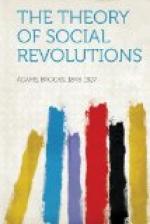Under such a stimulant Fouquier did his best, but he felt himself to be beaten. Examining Cambon, Danton broke out: “Do you believe us to be conspirators? Look, he laughs, he don’t believe it. Record that he has laughed.” Fouquier was at his wits’ end. If the next day the jury were asked if they had heard enough, and they answered, “No,” there would be an acquittal, and then Fouquier’s own head would roll into the basket. Probably there might even be insurrection. Fouquier wrote to the Committee that they must obtain from the Convention a decree silencing the defence. So grave was the crisis felt to be that the decree was unanimously voted. When Fouquier heard that the decree was on its way, he said, with a sigh of relief,—“Faith, we need it.” But when it was read, Danton sprung to his feet, raging, declaring that the public cried out treason upon it. The President adjourned the court while the hall resounded with the protests of the defendants and the shouts of the police as they tore the condemned from the benches which they clutched and dragged them through the corridors toward the prison. They emerged no more until they mounted the carts which took them to the scaffold.
Nor was it safe to hesitate if one were attached to this court. Fouquier had a clerk named Paris-Fabricius. Now Paris had been a friend of Danton and took his condemnation to heart. He even declined to sign the judgment, which it was his duty to do. The next day, when he presented himself to Fouquier, Fouquier looked at him sourly, and observed, “We don’t want men who reason here; we want business done.” The following morning Paris did not appear. His friends were disturbed, but he was not to be found. He had been cast into a secret dungeon in the prison of the Luxembourg.
So, if a man were too rich it might go hard with him. Louis-Philippe-Joseph, Duc d’Orleans, afterward known as Egalite, was one of the most interesting figures among the old nobility. The great-great-great-grandson of Louis XIII, he was a distant cousin of Louis XVI, and ranked as the first noble of France beyond the royal family. His education had been unfortunate. His father lived with a ballet-dancer, while his mother, the Princess Henriette de Bourbon-Conti, scandalized a society which was not easily shocked. During the Terror the sans culottes everywhere averred that the Duke was the son of a coachman in the service of the banker Duruet. Doubtless this was false, but the princess had abundant liaisons not much more reputable. Left to himself at sixteen years old, Egalite led a life of extreme profligacy, but he married one of the most beautiful and charming women of the age, whom he succeeded in inspiring with a devoted affection. Born in 1747, his father died in 1785, leaving him, just at the outbreak of the Revolution, the master of enormous wealth, and the father of three sons who adored him. The eldest of these was the future king, Louis-Philippe. The man must have




